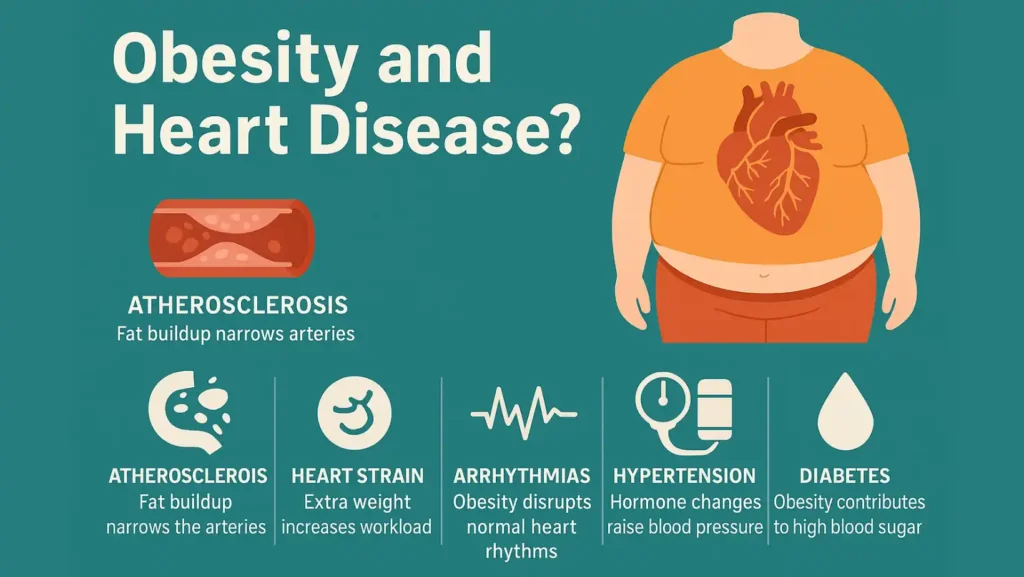Obesity and heart disease have a close and well-documented relationship. Extra body fat is not only about appearance, it changes the way your heart and blood vessels function. Researchers worldwide agree that weight gain raises the chance of multiple cardiac problems, from high blood pressure to clogged arteries.
Table of Contents
ToggleUnderstanding the link between obesity and heart disease is essential if you want to lower your risks and protect your long-term health.
How Is Obesity Defined?
To talk about obesity and heart disease risk, we must first understand how obesity is measured.
BMI Ranges and Obesity Classification
The most common tool is BMI (Body Mass Index). BMI is calculated by dividing your weight in kilograms by your height in meters squared.
Here’s how BMI classifies weight:
| BMI Range | Weight Category |
| 18.5 – 24.9 | Normal |
| 25 – 29.9 | Overweight |
| 30 – 34.9 | Obesity (Class I) |
| 35 – 39.9 | Obesity (Class II) |
| 40 or higher | Obesity (Class III, severe) |
A BMI over 30 raises your BMI and heart health risks, but BMI does not account for muscle mass or fat distribution. That is where other measures step in.
Waist-To-Hip Ratio Chart: A Better Measure Of Heart Risk
The Waist-to-hip ratio (WHR) is a stronger indicator of heart danger. It measures how fat is stored in your body.
- For men: WHR above 0.90 is high risk.
- For women: WHR above 0.85 is high risk.
People with belly-centered fat, called central obesity, carry more visceral fat around their organs. This type of fat is active in sending out inflammatory signals that trigger obesity-related complications like diabetes and heart strain. Compared to subcutaneous fat, which lies under the skin, visceral fat does more damage to blood vessels.
Does Obesity Raise Your Risk Of Heart Disease?

The short answer is yes. The link between obesity and heart disease is confirmed by decades of medical research. Below are the main ways extra fat harms the cardiovascular system.
Obesity And Atherosclerosis: How Fat Buildup Narrows Arteries
High body fat often leads to higher cholesterol and triglyceride levels. Bad cholesterol builds up inside arteries, creating sticky plaques. This process, known as atherosclerosis, narrows blood flow.
When blood cannot pass easily, the risk of coronary artery disease, angina, and even stroke / cerebrovascular disease rises. This explains why obesity and atherosclerosis are often linked.
How Obesity Taxes The Heart And Increases Workload
The heart is a pump, and with every extra pound, it needs to pump harder. This constant strain enlarges the ventricles (heart chambers). Over time, this extra load weakens the heart muscle and can result in heart failure. Doctors call this condition obesity-induced heart strain.
Obesity And Heart Rhythm Problems (Arrhythmias)
Obesity raises inflammation and changes the electrical signaling of the heart. This may trigger irregular rhythms, especially Atrial fibrillation (AFib). AFib is not harmless. It can form blood clots that travel to the brain, leading to a stroke.
Obesity And Hypertension: The Connection To High Blood Pressure

The tie between obesity and hypertension is well-known. Extra body fat increases the release of hormones that retain salt and water, leading to obesity and high blood pressure. Arteries stiffen, pressure climbs, and the heart is forced to push harder. Over time, this doubles the risk of a heart attack or stroke.
Obesity And Diabetes-Related Heart Complications
Fat around the waist often causes insulin resistance, a key driver of diabetes / type 2 diabetes. High sugar levels damage small arteries and nerves, feeding into metabolic syndrome and heart disease. Diabetes also accelerates cholesterol and obesity-related artery blockages, raising cardiovascular danger further.
Sleep Apnea, Obesity, And Cardiovascular Strain
People with obesity often suffer from sleep apnea. This condition interrupts breathing at night, lowering oxygen. Each pause strains the heart and raises blood pressure. Repeated cycles of poor oxygen supply increase cardiovascular risk factors and worsen heart problems caused by obesity.
Can Your Body Shape Be A Risk Factor For Heart Disease?
Yes. Fat distribution matters as much as the total amount.
Central Obesity And Heart Disease Risk
Central obesity describes fat stored mainly in the belly. This form of fat is dangerous because it is mostly visceral fat. Visceral fat releases chemicals that inflame arteries, promote atherosclerosis, and raise the chance of heart disease even in people with a normal BMI.
How Can Losing Weight Help Your Heart?
The benefits of weight loss are immediate and long-lasting. Shedding even 5–10 percent of your weight can lower many obesity-related complications.
Reducing Obesity And Hypertension Risk
Weight loss reduces salt retention and lowers pressure on the kidneys. Blood pressure drops, reducing the risk of hypertension and long-term damage from obesity and high blood pressure.
Improving Cholesterol And Circulation
Less body fat means lower LDL cholesterol and better blood vessel flexibility. Improved circulation helps protect against atherosclerosis and reduces the risk of coronary artery disease.
Lowering The Chance Of Atherosclerosis
With reduced inflammation, plaques form more slowly. Fewer blockages mean a lower obesity and heart disease risk and reduced odds of heart failure or stroke.
How To Get Started With Healthy Weight Loss?
Talk To Your Doctor Before Starting
Always consult your doctor first. They will check for existing heart strain, review medications, and suggest safe methods. Trusted bodies like the CDC (Centers for Disease Control and Prevention) and WHO (World Health Organization) also publish guidelines.
Adjust Your Diet For Heart Health
Switch to heart-friendly meals. The mediterranean diet has proven benefits. It includes olive oil, fish, whole grains, nuts, and vegetables. For some, intermittent fasting helps reduce calories and improve insulin sensitivity.
Pay Attention To Portion Sizes
Eating smaller portions helps avoid overeating. Slow eating gives your brain time to signal fullness.
Increase Physical Activity Safely
Exercise strengthens the heart and lowers fat. Even 30 minutes of physical activity / exercise like walking or cycling can cut weight management for heart health risks.
Identify Emotional And Lifestyle Triggers
Stress, fatigue, or emotions often push people to overeat. Recognizing these triggers helps avoid setbacks.
Focus On Realistic, Sustainable Goals
Crash diets rarely last. A safe goal is 1–2 pounds per week. Slow progress is easier to keep off.
Use Your Support Network For Motivation
Support from friends, family, or groups helps. Sharing progress keeps motivation high and prevents quitting.
Explore Other Weight Loss Options With Your Doctor
When lifestyle steps are not enough, surgery may be an option. Bariatric surgery (general) includes choices like Gastric sleeve, Gastric bypass (Roux-en-Y), and Gastric band. These reduce food intake and improve long-term heart outcomes.
The Bottom Line
The link between obesity and heart disease is powerful and backed by strong science. Excess weight raises blood pressure, fuels diabetes, accelerates atherosclerosis, and creates heart problems caused by obesity.
The good news is that risk drops quickly when weight loss begins. Even small steps in diet and activity protect the heart. By combining healthy eating, exercise, and medical advice, you can lower your obesity and heart disease risk and live longer with fewer complications.
FAQs
What is the link between heart disease and obesity?
Extra fat raises blood pressure, cholesterol, and blood sugar, which together increase obesity and heart disease risks.
How does obesity affect heart rate?
Excess weight forces the heart to pump harder, often raising resting heart rate and creating ongoing strain.
Can a heart problem cause weight gain?
Yes. Fluid buildup in heart failure or side effects from medication can cause sudden weight gain.
What is the link between heart disease and fat?
Belly fat, especially visceral fat, triggers inflammation that speeds atherosclerosis and raises cardiovascular risk.
Can you have heart disease without obesity?
Yes, people with normal weight can develop heart disease, though obesity and heart disease risk is far higher.
Does losing weight improve your heart health?
Yes. Weight loss lowers blood pressure, improves cholesterol, reduces sugar, and eases heart strain.
What are the first signs of a weak heart?
Early signs include breathlessness, swelling in the ankles, chest pressure, or quick tiredness during simple activity.

This article is medically reviewed by Dr. Chandril Chugh, Board-Certified Neurologist, providing expert insights and reliable health information.
Dr. Chandril Chugh is a U.S.-trained neurologist with over a decade of experience. Known for his compassionate care, he specializes in treating neurological conditions such as migraines, epilepsy, and Parkinson’s disease. Dr. Chugh is highly regarded for his patient-centered approach and dedication to providing personalized care.










